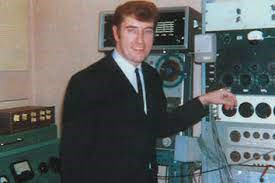


NEWS:
22 hours this month including two sessions and a special tribute to CAN
Artist Info
|
Joe Meek  Image from Discogs  Joe Meek (1929-1967) was an incredibly imaginative and progressive independent record producer and songwriter. Despite being tone-deaf and not being able to play a musical instrument or write notation, Meek displayed a remarkable facility for writing and producing successful commercial recordings. In writing songs he was reliant on musicians such as Dave Adams, Geoff Goddard or Charles Blackwell to transcribe melodies and chord-progressions from his "demos". He worked on 245 singles, of which 45 were major hits (top fifty or better). Joe Meek (1929-1967) was an incredibly imaginative and progressive independent record producer and songwriter. Despite being tone-deaf and not being able to play a musical instrument or write notation, Meek displayed a remarkable facility for writing and producing successful commercial recordings. In writing songs he was reliant on musicians such as Dave Adams, Geoff Goddard or Charles Blackwell to transcribe melodies and chord-progressions from his "demos". He worked on 245 singles, of which 45 were major hits (top fifty or better).He pioneered studio tools such as multiple over-dubbing on one- and two-track machines, close miking, direct input of bass-guitars, the compressor, and effects like echo and reverb, as well as sampling. Unlike other producers, his search was for the "right sound" rather than for a catchy musical tune, and throughout his brief career he single-mindedly followed his quest to create a unique "sonic signature" for every record he produced. At a time when many studio engineers were still wearing white coats and assiduously trying to maintain clarity and fidelity, Meek, the maverick, was producing everything on the three floors of his home studio and was never afraid to distort or manipulate the sound if it created the effect he was seeking. For the song "Johnny Remember Me" he placed the violins on the stairs, the drummer almost in the bathroom, and the brass section on a different floor entirely. Meek was one of the first producers to grasp and fully exploit the possibilities of the modern recording studio. His innovative techniques -- physically separating instruments, treating instruments and voices with echo and reverb, processing the sound through his fabled home-made electronic devices, the combining of separately-recorded performances and segments into a painstakingly constructed composite recording -- comprised a major breakthrough in sound production. Up to that time, the standard technique for recordings, regardless of musical genre, was to record all the performers in one studio playing together in real time as the music was cut live to tape all at once. Joe Meek's recording techniques (as well as the recording techniques of Les Paul) did much to further the art of record production as we know it today. Besides his idiosyncratic music production, many of Meek's character eccentricities continue to capture the imagination of people today. Although never properly diagnosed, it is believed today by many that Meek suffered from bipolar disorder type one (some even suggest further that he was paranoid-schizophrenic). Meek was obsessed with outer space, the occult and the idea of "the other side". He would set up tape machines in graveyards in a vain attempt to record voices from beyond the grave, in one instance capturing the meows of a cat he claimed was speaking in human tones, asking for help. In particular, he had an obsession with Buddy Holly (claiming the late American rocker had communicated with him in dreams). His professional efforts were often hindered by his paranoia (Meek was known to tear up his walls as he was convinced that Decca Records would put hidden microphones behind his wallpaper in order to steal his ideas), drug use, and attacks of sudden rage and depression. Meek's homosexuality (illegal in the UK at the time) also put him under pressure during his career. He had been charged with "importuning for immoral purposes" in 1963 and was consequently subjected to blackmail. In January of 1967, police in Tattingstone, Suffolk, discovered a suitcase containing the mutilated body of Bernard Oliver, an alleged rent boy who had previously associated with Meek. According to some accounts, Meek became concerned that he would be involved in the murder investigation when the Metropolitan police stated that they would be interviewing all known homosexuals in the city. On February 3rd, 1967, the eighth anniversary of Buddy Holly's death, Meek killed his landlady Violet Shenton and then himself with a single barreled shotgun that he had confiscated from his protegé, former The Tornados' bassist and solo star Heinz Burt. Joe Meek was 37 at the time of his death. Read more on Last.fm. User-contributed text is available under the Creative Commons By-SA License; additional terms may apply. Artist biography from last.fm Some other places to look for information: last.fm Discogs MusicBrainz |
